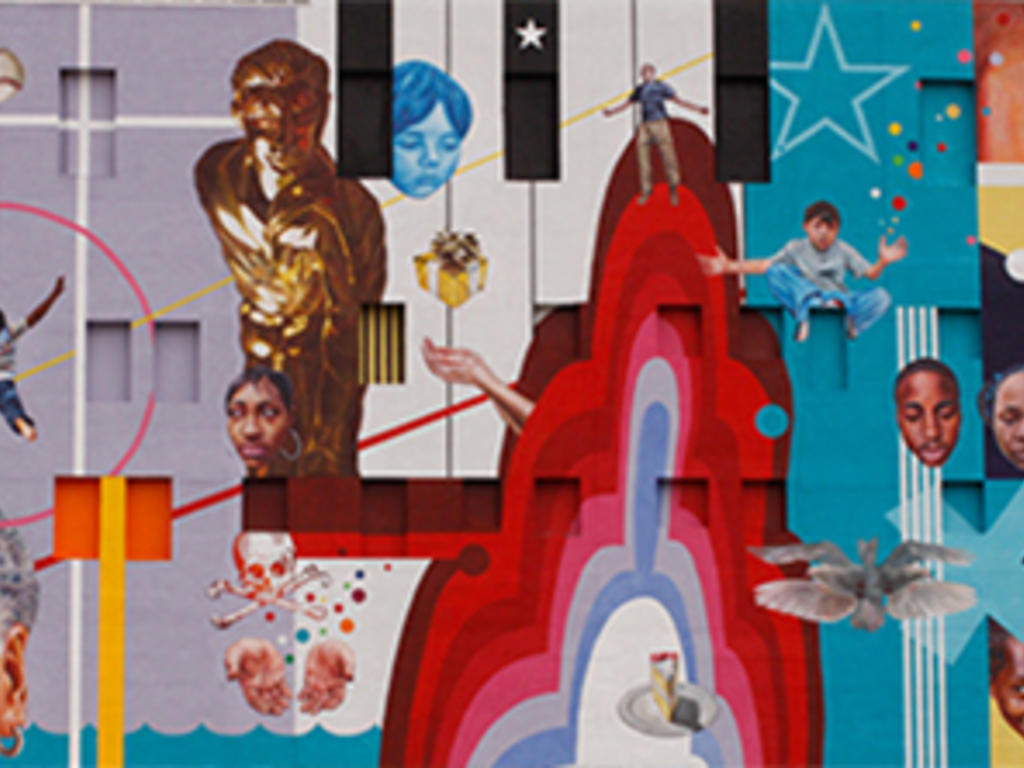By Katie Cannon ′15
The Center for Outreach and Development in the Arts (CODA) has always been “kind of an enigma” for students, says the program’s director, Professor Liz Daggett. While for many Rhodents CODA represents little more than a mysterious acronym offering cheap tickets to the theatre, the program offers so much more. Whether through a fellowship, an individual project grant, or an arts promotion, CODA provides students the opportunity to pursue passions and cultivate skills that might ordinarily be out of reach.
For students interested in the arts and service, a CODA fellowship is an outlet for both artistic and philanthropic inclinations. Fellows work at least 10 hours a week in their field of interest, using their skills to make connections and make a difference in the Memphis community. Have a big idea about something you want to make happen in the arts community? An issue you’d like to address or a population you’d like to serve? CODA fellows regularly take on their own projects on campus and in Memphis, often using art to draw attention to social issues or help underserved communities. Rhodes events like Sound Out for Syria, a music benefit and silent auction aiding Syrian refugees, and Unsheltered:Unseen, an art show displaying the photography of the homeless, are both partially funded by CODA and worked by CODA fellows.
Whether working in a traditional internship with a local arts organization like the Urban Arts Commission or taking on a personal project, all CODA fellows must play important roles in their respective pursuits. “You have to put in the work, and be really excited about your project. You have to be doing something that you think is cool, and you have to have a certain level of responsibility and be in charge,” says Daggett. “Nobody’s just getting coffee.” Outside of that, though, CODA doesn’t place a lot of restrictions on their fellows. “For some people it’ll be a two-week project, and then they’ll move on to something else, or they’ll work on two things at the same time, maybe one thing that’s more creative and another that’s more organizational,” says Daggett.
While Daggett is always there to help students when they need it, she has adopted a sort of “sink or swim” philosophy: “It’s a little bit Wild West,” she says. CODA fellows must come up with their own ideas, confront their problems head-on, and figure out their own solutions—skills that will be invaluable throughout their careers. Says Daggett, “When they’re talking with a future employer or interviewing for grad school, and they get asked the biggest challenge they’ve faced, they’ll have a story from their CODA project.”
There’s also a collaborative nature to the program. Says Daggett, “Maybe you have a few ideas and you’ve shown a lot of promise in your classroom, but you’re not quite equipped to put on some huge show, or maybe you want to do something but you don’t want to do it by yourself. CODA’s really valuable in that way.”
Fellowship applicants must be rising sophomores, but they can come from any major, as long as they can demonstrate an interest and skill in some form of art, be it visual, musical, or theatrical. Fellow Emma Vescovo ’16, through connections made by CODA, has had the opportunity to work with one of her idols: Elaine Blanchard, the brain behind the lauded play Prison Stories. Emma had already been working with local organization Carpenter Art Garden, something she expanded on through a CODA fellowship, but she was also able to make things happen in the theatre community. With the help of Helen Huettner ’14, Emma brought the Prison Stories documentary to Rhodes, and this summer, she has been working with Blanchard to produce Positive Stories, a play that tells the stories of people living with HIV.
However, you don’t have to be a CODA fellow to get support for your own aspirations—any student with an idea for a project can apply for a CODA grant. Olivia Knauss ’15 received a grant to fund a summer art camp for the children in the Refugee Empowerment Program, culminating in a gallery show and silent auction to benefit the REP.
CODA involves the entire Rhodes and the city-wide community in other ways, as well. As mentioned before, the program regularly offers affordable opportunities for cash-strapped collegiate types to enjoy the arts, such as $5.00 tickets to see shows at the ritzy Orpheum theatre, where national tours of Broadway hits often play. All students have to do when they see an ad for these tickets is head over to Rhodes Express and buy them (but they′ll have to be fast!) Past community-oriented CODA projects include helping to manage the creation of the Rhodes-Hill Mural, a vibrant depiction of the present and future of Memphis. And for those interested in showing off their art chops, CODA′s annual Exhibition Momentum juried art show asks for performance or visual art submissions from any artist between the ages 18 and 25. This year′s show enticed applicants with "a chance to claim eternal glory, $100 cash prize for first place within the category, and a trophy." Even if you′re not seeking artistic renown, the show is a great opportunity for students, faculty, and Memphians alike to admire the work of rising young artists. In these projects and in countless others, CODA has united the arts and service, while fostering a culture of creativity both on campus and in the community.
